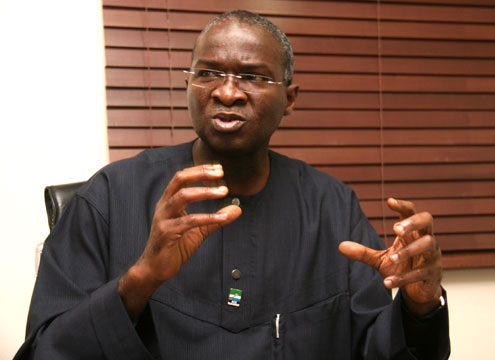 The Minister of Power, Works and Housing, Mr Babatunde Fashola, on Thursday in Lagos called for law and order which, he noted, were the most important ingredients to have a city that works for everyone.
The Minister of Power, Works and Housing, Mr Babatunde Fashola, on Thursday in Lagos called for law and order which, he noted, were the most important ingredients to have a city that works for everyone.
Fashola made the call while speaking on the theme: “A City that Works’’ at the Opening of the 2019 Annual Conference of the Nigerian Institution of Estate Surveyors and Valuers (NIESV) in Lagos.
He said that planning and regulation of construction and their distribution were important to achieving development in cities as disorderliness affected distribution of land and houses.
He called on the NIESV to come up with “a predictable national land valuation database’’ to assist government to plan better as according to him, several houses were unoccupied in the nation.
He faulted the housing deficit figure of 17 million due to unsubstantiated data being repeated and revalidated by various groups.
Declaring the conference open, Fashola said: “No city or community will function to our expectations if those cities do not subscribe to law and order.
“Can this body (NIESV) in its closing do a valuation of how many houses are empty and unoccupied in Nigeria? So we can ascertain how long they have been empty and what can be done to make them habitable to be occupied,’’ he said.
He said that law and order should be obeyed by Nigerians and adopted as a religion to reduce road accidents.
Fashola told journalists that recent records collated by the FRSC showed that more than 50 per cent of accidents, crashes and deaths on highways were caused by speeding.
He said 59 per cent of the vehicles involved in those crashes were commercial vehicles.
“The data also showed that the accidents that are attributable to bad roads are 0.55 per cent, less than one per cent,’’ he said.
He called for training of commercial drivers, observance of speed limits, certifying drivers, marking lanes and adherence to road safety rules to reduce crashes.
The guest lecturer, Prof. Mustapha Zubairu, Project Manager, Niger State Urban Support Programme, agreed with Fashola that order was important but noted that cities were getting bigger and the challenges of the growth were affecting orderliness in terms of infrastructure distribution.
Zubairu said that the non-availability of infrastructure to rural dwellers was increasing migration to cities putting pressure on facilities and called for implementation of existing laws to ensure even development.
“The worst facilities you have in cities are better than the best in rural areas hence the constant migration to urban centers,’’ he said.
He said that a recent survey showed that 60 per cent of people already live in cities and the number will increase except all tiers of government in Nigeria rise to work in harmony to address issue of infrastructure.
He called for reforms in government policies to address rural urban migration, adding that, “unplanned urbanisation leads to growth of slums within and around our cities.’’
President of the NIESV, Mr Rowland Abonta, said that the institution had completed its Abuja Property Data Bank and was already collating data for other areas.
He commended efforts of the Federal Government and the Lagos State Government toward its achieving success in the data collation and NIESV activities.










